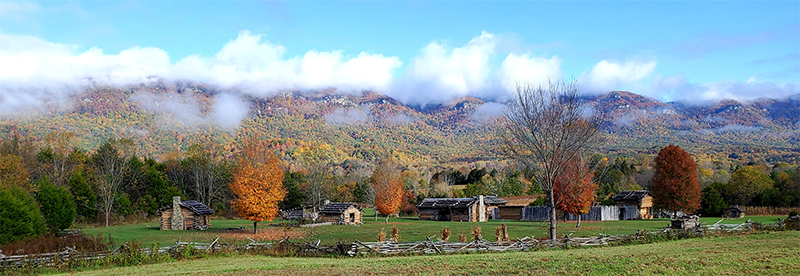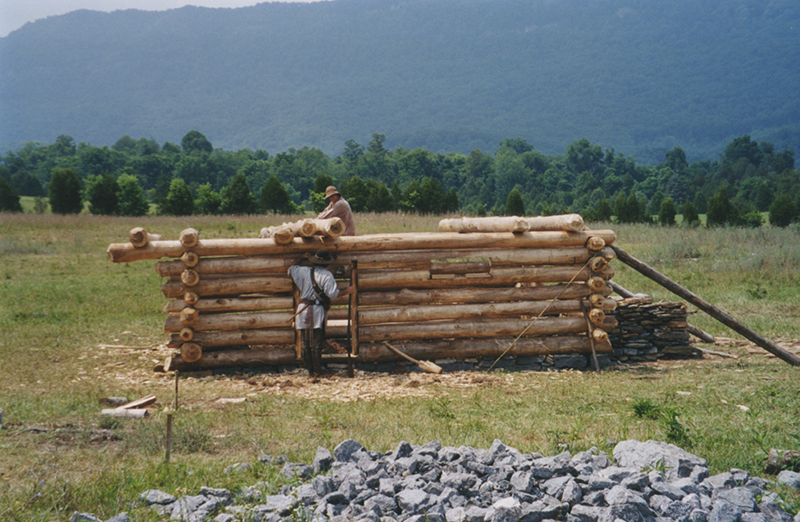
 Department of Conservation and Recreation
Department of Conservation and Recreation
Conserve. Protect. Enjoy.
 Department of Conservation and Recreation
Department of Conservation and Recreation
By Maggi TinsleyPosted September 23, 2022

Wilderness Road State Park Manager Billy Heck first came to the park in the late 1990s to volunteer as an historical interpreter. When he heard that they'd be building some period cabins, he had ideas.
“I told the park manager, if you're going to build this pioneer village, you should reconstruct Martin’s Station, because that original fort was just a few miles from here,” Heck recalled.
Heck knew all about the original Martin's Station that was constructed by Captain Joseph Martin of Charlottesville in what is now Rose Hill, Virginia, in 1775. In fact, he had tried to rebuild the fort as a private venture, but was stymied by an inability to get the construction project insured. Convinced, the park’s manager asked him to spearhead the project in 2000, so Heck moved from a volunteer role into a post as a wage employee and began to assemble a crew.

Beginning construction at Martin’s Station in 2002.
Heck felt strongly that the fort should be built while maintaining historical accuracy – that meant using authentic tools, for starters. In order for that to happen, the General Assembly had to grant the project authority for use of technology exempt from 21st-century state and local building codes. While that legislation worked its way toward passage, Heck constructed a lone cabin in 2000 as a temporary exhibition, providing a “neat research period” in advance of the full build.
When the government gave its go-ahead, Heck and the fellow reenactors he'd recruited began their “six-month social experiment” of living and working as if the year was 1775, he recalled. Not only would their tools be of the period, so would their garments, lodging and everything they ate.
On June 10, 2002, 26 volunteers, 18 horses, and a pair of oxen arrived, their wagon loaded with tools and 800 pounds of dried food stored in linen bags. “We set one rule,” Heck explains: “Once you crossed the split-rail fence, it was 1775. We didn't allow anything that was invented or first used past that date.”
Sticking to that commitment took some research, including primary-source accounts and records of period trash piles of broken things. “We found that we would start to see wear patterns on our clothing,” Heck recalled, explaining the impetus to switch to leather garments. Linen didn't hold up to sweat, for example. “Also, we used to think that cotton wasn't worn, but research from Colonial Williamsburg told us that while linen was prevalent, cotton was available as well,” he said. Naturally, all of the clothing had been hand-sewn by the reenactor community.

Billy Heck in his period gear in 2002.
As for food, because 2002 was one of the hottest summers Southwest Virginia had seen, the workers’ meals were neither heavy nor hot. One aspect that was different from the 18th century, however, was that tasks were not divided by gender, so the female volunteers were not the only cooks, and they took on the full range of construction duties as well.
The project took just under six months. “We finished the last fireplaces right at the end of November,” Heck remembered. And for 20 years, Martin’s Station has been the place for visitors to experience the Virginia frontier of 1775. The living history museum is the ideal place to learn the story of western migration and the indigenous people that explorers encountered.
Heck will be ready to celebrate the project’s 20th anniversary at the Martin's Station Fall Encampment Oct. 7-9, 2022. Visitors can step back in time to the 18th century and experience the harvest of Powell’s Valley. Skilled tradesmen will demonstrate blacksmithing and period gunsmithing, while others show open-hearth cooking and fiber arts like spinning and natural dyeing. There will even be a militia drill.
On Saturday, Oct. 8, the Wilderness Road Heritage Festival recognizes Southwest Virginia's unique cultural heritage with more demonstrations of time-honored skills, a sale of handmade Appalachian crafts and musicians to keep guests entertained. There will also be children’s educational activities with an Appalachian theme. And, as always, visitors can hike, bike or horseback ride on the park’s trails.
As he looked at Kentucky from one window and Tennessee from the other, Heck proudly noted that “we are still running programs here five days a week. We've had to replace some palisade walls and roof shakes over the years, but the structures are holding up well.”

And so is the park’s current manager. “I came on as a volunteer because the Martin’s Station project was my dream come true,” Heck said, noting his belief that Wilderness Road may be the nation’s only state park that created something so authentic. He gives a lot of credit to Virginia’s Department of Conservation and Recreation, which oversees Virginia State Parks. “I’m not sure you'd have found any other agency so willing to break new ground,” he noted.
Categories
State Parks
Tags
state parks

